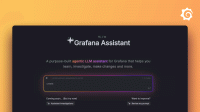This is documentation for the next version of Grafana Alloy Documentation. For the latest stable release, go to the latest version.
loki.source.api
loki.source.api receives log entries over HTTP and forwards them to other loki.* components.
The HTTP API exposed is compatible with Loki push API and the logproto format.
This means that other loki.write components can be used as a client and send requests to loki.source.api which enables using Alloy as a proxy for logs.
Usage
loki.source.api "<LABEL>" {
http {
listen_address = "<LISTEN_ADDRESS>"
listen_port = "<PORT>"
}
forward_to = <RECEIVER_LIST>
}The component starts an HTTP server on the configured port and address with the following endpoints:
/loki/api/v1/push- acceptingPOSTrequests compatible with Loki push API, for example, from another Alloy’sloki.writecomponent./loki/api/v1/raw- acceptingPOSTrequests with newline-delimited log lines in body. This can be used to send NDJSON or plain text logs. This is compatible with the Promtail push API endpoint. Refer to the Promtail documentation for more information. When this endpoint is used, the incoming timestamps can’t be used and theuse_incoming_timestamp = truesetting is ignored./ready- acceptingGETrequests. Can be used to confirm the server is reachable and healthy./api/v1/push- internally reroutes to/loki/api/v1/push./api/v1/raw- internally reroutes to/loki/api/v1/raw.
Arguments
You can use the following arguments with loki.source.api:
The relabel_rules field can make use of the rules export value from a loki.relabel component to apply one or more relabeling rules to log entries before they’re forwarded to the list of receivers in forward_to.
Blocks
You can use the following blocks with loki.source.api:
The > symbol indicates deeper levels of nesting.
For example, http > tls refers to a tls block defined inside an http block.
http
The http block configures the HTTP server.
You can use the following arguments to configure the http block. Any omitted fields take their default values.
tls
The tls block configures TLS for the HTTP server.
The following pairs of arguments are mutually exclusive and can’t both be set simultaneously:
cert_pemandcert_filekey_pemandkey_file
When configuring client authentication, both the client certificate (using cert_pem or cert_file) and the client key (using key_pem or key_file) must be provided.
Exported fields
loki.source.api doesn’t export any fields.
Component health
loki.source.api is only reported as unhealthy if given an invalid configuration.
Debug metrics
The following are some of the metrics that are exposed when this component is used.
The metrics include labels such as status_code where relevant, which can be used to measure request success rates.
loki_source_api_request_duration_seconds(histogram): Time (in seconds) spent serving HTTP requests.loki_source_api_request_message_bytes(histogram): Size (in bytes) of messages received in the request.loki_source_api_response_message_bytes(histogram): Size (in bytes) of messages sent in response.loki_source_api_tcp_connections(gauge): Current number of accepted TCP connections.loki_source_api_entries_written(counter): Total number of log entries forwarded.
Example
This example starts an HTTP server on 0.0.0.0 address and port 9999.
The server receives log entries and forwards them to a loki.write component while adding a forwarded="true" label.
The loki.write component sends the logs to the specified Loki instance using basic auth credentials provided.
loki.write "local" {
endpoint {
url = "http://loki:3100/api/v1/push"
basic_auth {
username = "<USERNAME>"
password_file = "<PASSWORD_FILE>"
}
}
}
loki.source.api "loki_push_api" {
http {
listen_address = "0.0.0.0"
listen_port = 9999
}
forward_to = [
loki.write.local.receiver,
]
labels = {
forwarded = "true",
}
}Replace the following:
<USERNAME>: Your username.<PASSWORD_FILE>: Your password file.
Technical details
loki.source.api filters out all labels that start with __, for example, __tenant_id__.
If you need to be able to set the tenant ID, you must either make sure the X-Scope-OrgID header is present or use the loki.process component.
Compatible components
loki.source.api can accept arguments from the following components:
- Components that export Loki
LogsReceiver
Note
Connecting some components may not be sensible or components may require further configuration to make the connection work correctly. Refer to the linked documentation for more details.



